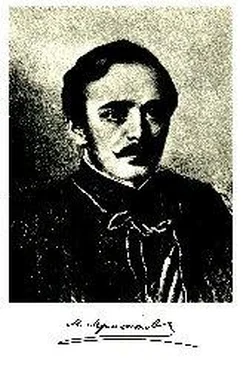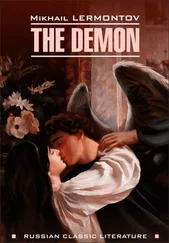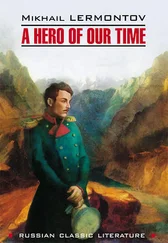"The first half of the next day she was quiet, silent and submissive in spite of the way our surgeon tortured her with hot wet pads [62] we couldn't bring ourselves to use the word "poultice" here.
and other remedies. 'My good man!' I protested. 'You yourself said she would not live, why then all these medicines of yours?' 'Got to do it, just the same, Maksim Maksimich,' he replied, 'so that my conscience will be at peace.' Conscience my eye!
"In the afternoon she was tortured by thirst. We opened the windows, but it was hotter outside than in the room. We placed ice next to her bed, but nothing helped. I knew that this unbearable thirst was a sign that the end was approaching, and I said so to Pechorin. 'Water, water,' she repeated hoarsely, raising herself from the bed.
"He went white as a sheet, picked up a glass, filled it with water, and gave it to her. I buried my face in my hands and began to recite a prayer, I can't remember which. Yes, sir, I had been through a great deal in my time, had seen men die in hospitals and on the battlefield, but it had been nothing like this! Nothing! I must confess that there was something else that made me sad-not once before her death did she remember me, and I think I loved her like a father. Well... May God forgive her! But then who am I that anyone would remember me on their death bed?
"As soon as she had drunk the water she felt better, and some three minutes later she passed away. We pressed a mirror to her lips, but nothing showed on it. I led Pechorin out of the room, and then we walked on the fort wall, pacing back and forth side by side for a long while without uttering a word, our hands behind our backs. It angered me to detect no sign of emotion on his face, for in his place I'd have died of grief. Finally, he sat down on the ground in the shade and began to draw something in the sand with a stick. I began to speak, wishing to console him, more for the sake of good form than anything else, you know, whereupon he looked up and laughed... That laugh sent cold shivers running up and down my spine... I went to order the coffin.
"I confess that it was partly for distraction that I occupied myself with this business. I covered the coffin with a piece of Persian silk I had and ornamented it with some Circassian silver lace Grigoriy Aleksandrovich had bought for her.
"Early the next morning we buried her beyond the fort, next to the spot on the river bank where she had sat that last time. The small grave is now surrounded by white acacia and elder bushes. I wanted to put up a cross, but that was a bit awkward, you know, for after all she was not a Christian...
"What did Pechorin do?' I asked.
"He was sick for a long time and lost weight, the poor guy. But we never spoke about Bela after that. I saw it'd be painful for him, so why should I mention her? Some three months later he was ordered to join the N- regiment, and he went to Georgia. I haven't seen him since. Oh yes, I remember someone telling me recently that he had returned to Russia, though it hadn't been mentioned in the divisional orders. Usually it takes a long time before news reaches us here."
Here, probably to drown his sad memories, he launched upon a long dissertation concerning the disadvantages of hearing year-old news.
I neither interrupted him nor listened.
An hour later it was already possible to continue our journey. The blizzard had died down and the sky cleared up, and we set out. On the road, however, I couldn't help directing the conversation back to Bela and Pechorin.
"Did you ever happen to hear what became of Kazbich?" I asked.
"Kazbich? Really, I don't know. I have heard that the Shapsugs [63] or Shapsugi, a tribe of the Circassians in the northwest Caucasus.
on the right flank of the line have a Kazbich, a daredevil fellow who wears a red beshmet , rides at a trot under our fire and bows with exaggerated politeness whenever a bullet whistles near him, but I doubt whether it's the same man."
Maksim Maksimich and I separated at Kobi, for I took the fast coach and he couldn't keep pace with me because of the heavy baggage. At the time we didn't think we'd ever meet again, yet we did, and if you wish, I'll tell you about it, but that is a story in itself... You must admit, however, that Maksim Maksimich is a man you can respect. If you do admit it, I'll be amply rewarded for my story, overlong though it may have been.
"After parting with Maksim Maksimich, I made good time through the Terek and Daryal gorges and had breakfast at Kazbek and tea at Lars, driving into Vladikavkaz by supper time. I won't bore you with descriptions of mountains, exclamations that mean nothing and canvases that convey nothing, especially to those who have never been in these places, nor with statistical observations which, I'm certain, no one would bother to read.
I stayed at an inn where all travelers stay and where, incidentally, there is no one to serve you a roast pheasant or a plate of cabbage soup, for the three veterans in charge are either so stupid or so drunk that there is nothing to be got from them.
I was told that I would have to stay there for another three days, because the "occasional" [ okaziya , or detail] from Yekaterinograd [64] now Krasnodar, North Caucasus, spa town perhaps 60 miles northwest of Vladikavkaz.
hadn't come in yet, and therefore couldn't set out on the return trip. What an occasion! But a bad pun is no consolation to a Russian and in order to while away the time I decided to write down Maksim Maksimich's story about Bela, quite unaware that it would turn out to be the first link in a long chain of tales [9] the division into parts this way makes no sense (Nabokov called it "purely fortuitous") and seems to have been an invention of the clumsy editor of the second edition. Russian literature did not yet have a tradition of the prose novel, while European printers at the time usually divided novels into separate volumes for convenience and sales. If one wanted to read the book in chronological order of the fictional events, it would be this way: Taman, Princess Mary, Bela (The Fatalist comes in the middle of this), Maksim Maksimich, and the Preface. However, the order Lermontov uses does spiral in on Pechorin's character effectively. By the way, there are references in the book to "a long chain of tales" and teases about "a fat notebook" of remaining material, but, sorry, this is all we've got.
. So you see how an occurrence insignificant in itself may have serious consequences... But perhaps you don't know what an "occasional" is? It's an escort of half a company of infantry and a gun detailed to protect the caravans [65] the dry steppes, or rolling upland prairie hills north of the Caucasus, were crossed by (Bactrian) camel caravans.
crossing Kabarda from Vladikavkaz to Yekarerinograd.
The first day was very boring, but early the next morning a carriage drove into the yard. It was Maksim Maksimich! We greeted each other like old friends. I offered him the use of my room. He didn't stand on ceremony. He even clapped me on the shoulder, and his mouth twisted into what passed for a smile. An odd man!
Maksim Maksimich was well versed in the culinary arts and turned out a wonderful roast pheasant with an excellent pickled cucumber sauce. I must admit that without him I would've had only a cold snack. A bottle of Kakherian wine helped us overlook the modesty of the meal, which consisted of only one course. Afterwards we lit our pipes and settled down for a smoke, I near the window and he next to the stove where a fire was going, for the day was chilly and raw. We sat in silence-what was there to say?... He'd already told me all that was interesting about himself, and I had nothing to tell him. I looked out of the window. A long string of low houses, sprawling along the bank of the Terek, which here spreads wider and wider, was visible through the trees, while in the distance was the blue serrated wall of the mountains with Kazbek in its white cardinal's hat peeping over it. Mentally I was bidding them goodbye. I felt sorry to leave them...
Читать дальше

![Михаил Лермонтов - A Hero of Our Time [New Translation]](/books/27671/mihail-lermontov-a-hero-of-our-time-new-translati-thumb.webp)










